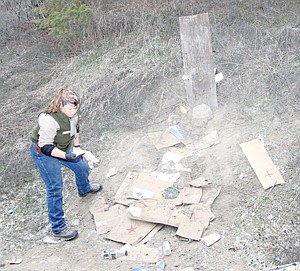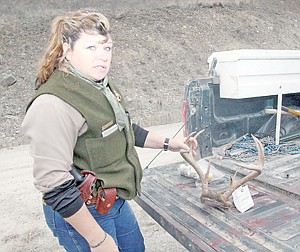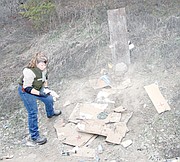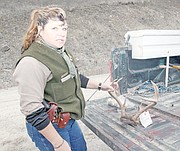Laverdure: Patrolling woodlands
Without fail, Libby Game Warden Tamie Laverdure begins her conversations with hunters one way.
“Any luck?” she asks.
She has not had much lately. In the closing days of hunting season, she is investigating four cases of decapitated deer. A fifth such case was reported in Troy. She has worked 136 hours the past two weeks, and says she is tired. She does not show it, however, as she drives her 2006 Ford F150 through the Cody Creek area by Fisher River. Approaching the site of potentially another headless deer, Laverdure shifts to park, which the gear shift indicator never moves from.
Quickly after examining the site, Laverdure is relieved to find an acceptably harvested deer. The report turns out to be nothing, but that is a good thing. And without tips from ethical hunters, Laverdure says she would be helpless to cover the 2,000 square-mile Region 1.
“Responsible sportsmen are my eyes and ears,” Laverdure says.
The cases of decapitated deer particularly upset her. Those unethical hunters are stealing opportunities from law-abiding hunters to claim, and better utilize, big game. There is no pride in such a hunt. No honor.
Laverdure conducted 131 hunter contacts last month, meaning 131 times she asked for luck. Hunter success rates are up from last year, but as always she hears plenty of groans. When hunters talk about seeing nothing but wolf tracks, she asks how many wolf tags they have bought. Hunters are allowed up to five, she reminds them. She has only checked three wolves all season.
“Standing in town and complaining does not make them go away,” Laverdure says.
Growing up on a ranch in Cody, Wyo., Laverdure always wanted to be a game warden. She went hunting with her adoptive grandfather, whom she calls her hero, and the two hunted for meat, not antlers. She knew she had interest in the position. She did not know if she could make the marks.
“School was not easy for me,” Laverdure says.
Still, she earned a degree in Enviornmental Interpretation from University of Montana-Western. A sworn peace officer, she was hired as a warden trainee in Jan. 2011. Before the hire, Laverdure worked in an open pit gold mine and operated heavy machinery.
With no children of her own, Laverdure waxes poetic about young hunters learning the sport from their parents. More than any other part of her job, she loves hearing folks’ hunting stories. She treasures giving fishing lessons to kids and wants to be more hands on with hunter’s education.
“There were four youth violations this year,” Laverdure says. “I want to get involved in more education.”
In her roving Ford office, which smells strongly of the four black ice air fresheners she keeps stacked near her center console, Laverdure approaches a truck with a blown front left tire and a dangling front license plate. A man is loading wood into the flatbed as a woman smokes a cigarette nearby. The man says he does not have his wood permit with him at the moment. The truck is his girlfriend’s. The woman is just a friend and the flat is the spare. The story does not sound straight, but Laverdure runs the plate and takes the man’s information. There are more important things to do.
Lately she has been working to run a mother moose and her calf out of Libby. The duo’s romps through town have attracted attention. The moose are not aggressive, but the story is too familiar for Laverdure’s comfort. The fallout of the controversial September shooting of a popular deer some called Spanky has been tough on her.
“I’ve had people call my house and leave horrible messages,” Laverdure said. “I had an old woman come up to me at the grocery store and say she was disgusted by me. I just hope people understand I am low woman on the totem pole. I followed orders.”
She adds that the buck’s rack is in a Kalispell regional office, not her cabin.
Since the incident, Laverdure has relied upon what she calls her best weapon to ease perceptions.
“My words and tone of voice are so important,” Laverdure says. “I listen and try to show people I am here to help. They pay my wage, it comes from hunters’ license sales.”
Off a side road, Laverdure finds a makeshift target practice range below a hill. The arrangement is fine, but the accompanying litter is not. Sometimes, Laverdure says, people leave trash with the names on it. She checks the pile, but finds nothing. No tickets this time.
“I love exploring the country,” Laverdure said. “I want people to respect it.”






